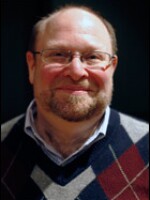Legendary British stage director Peter Brook has made a career of deconstructing and reinvestigating the classics. He rearranged the soliloquies in Shakespeare's Hamlet,and cut the chorus from Bizet's Carmenand set it in a bullring. Now, at 86, Brook is taking on one of Wolfgang Amadeus Mozart's best-loved works, The Magic Flute.
"You can't say what attracts you to The Magic Flute," Brook says. "It's like saying what attracts you to go to Egypt and look at the pyramids and the Sphinx. The Magic Flute is one of the works that's beyond being attracted or not — it is."
But that's not to say that Brook and his collaborators, composer Franck Krawczyk and librettist Marie-Helene Estienne, haven't taken liberties in this production, cannily titled A Magic Flute. Brook says they wanted to somehow find the essence of what Mozart and his collaborator, actor and theater impresario Emanuel Schikaneder, were getting at. To do so, they stripped away the embellishments that others have added over the centuries.
"We saw some characters are no longer necessary," Brook says. "And in taking away these characters and taking away some of the necessary decorations of the music and story of the time, we find that Schikaneder was writing a beautifully pure story."
A beautifully pure story about true love finding its way through trials and tribulations and, yes, magic. Brook points out that while The Magic Flute is now staged in opera houses around the world, it came from a very different place: With its spoken dialogue, it was more like an 18th century musical.
"Schikaneder was a practical man with a little popular theater. It wasn't a grand opera," says Brook. "So Mozart said at once, 'I would love to come and work with you, but we won't call it an opera, we'll call it a singspiel,' a sung play. So that, at once, liberated it from every grand opera or major opera house tradition."
And Brook and his collaborators have liberated it even further. Instead of a large cast, there are seven singers and two actors who serve as stagehands of sorts. Instead of elaborate sets — the 1791 original was an extravaganza that featured a working waterfall — here the stage is bare, save for a couple dozen bamboo sticks. And, instead of an orchestra, there is just one piano played by Franck Krawczyk, who adapted Mozart's score for this production.
"For us," Krawczyk says, "having the piano as the sole instrument on this performance enables us to bring together, in a way, all of those instruments — without having to bear in mind we have baroque instruments here, we have specific instruments there. The piano is the orchestra of all orchestras!"
Both Mozart and Schikaneder were filled with the ideals of the Enlightenment and the human potential for good. Brook says The Magic Flute provides a tonic for our age.
"It is possible," he says, "for a brief moment, to have hope within ourselves for the human condition, for the human possibility, to be irrigated, refreshed and nourished through Mozart and Schikaneder."
A Magic Flute is playing in New York at the Lincoln Center Festival through July 17.
Copyright 2020 NPR. To see more, visit https://www.npr.org. 9(MDAxNDQ2NDAxMDEyNzU2NzM2ODA3ZGI1ZA001))




